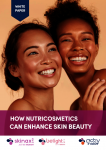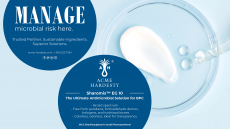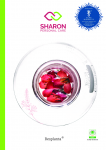European harmonisation of organic and naturals to become reality
organic and natural cosmetics is under way, explained the President
of Cosmebio at this year's Beyond Beauty show.
According to Rodolphe Balz the president of Cosmebio - the French professional association for natural and organic cosmetics - an important step towards European harmonisation has been made in the regulation of natural and organic cosmetics. Such regulations promise to make things easier for both the consumer and the industry in this increasingly important market sector. Talks have been long ongoing between the Soil Association in the UK, the BDIH of Germany, AIAB of Italy and the EcoGarantie of Belgium, although details still remain to be decided. The European wide system, the specifications of which are to be released in June 2008, will be a two level specification system: natural and organic. This differs little from the current French system, increasingly becoming popular internationally for its flexible nature, which already has both a natural and an organic certification provided by Ecocert. However in the other European countries that have been involved in the discussions - the UK, Germany, Belgium and Italy - the situation is somewhat different. For example, in the UK the Soil Association does not recognise 'natural' products and applies the same stringent standards to organic cosmetics as it does for organic agriculture. The situation in Germany is the reverse with the BDIH (Germany's biggest certification body) providing a natural standard but not an organic one. These differences provided for active, if somewhat complex discussions, according to Balz and his fellow speakers, as the interested parties attempted to come to an agreement on an acceptable European wide set of regulations. Although many of the details still remain to be decided, a two tier system of natural and organic certification appears to have been, primarily at least, accepted. Preliminary discussions have agreed that for a product to be accepted as natural, at least 95 percent of its ingredients must be of natural origin. Regarding the certification of organic products, finer details become a little more complicated, as not all ingredients contained in cosmetics products are certifiable organic. For example water, that cannot be certified, occurs in very high concentrations in cosmetics product. Similarly mineral extracts and salts are also uncertifiable. For ingredients that are of vegetal origin organic certification is possible, and in order for a product to qualify manufacturers will be asked to prove that 95 percent of such material is organic. According to the speakers, the most complex of all types of ingredients are those that are of natural/ vegetal origin but have to undergo some kind of chemical transformation, often using solvents and chemicals that are not organic, before they can be incorporated into products. In this case it is proposed that there will be a list of accepted and not accepted processes and chemicals, for example all process that involve the use of petrochemicals may be banned. In order to qualify manufacturers will be forced to use a certain percentage of ingredients that derive from this so called 'green chemistry' in the hope that this will encourage the industry to investigate possible green processes that may otherwise not be profitable. The last type of ingredient is preservatives, which are notoriously problematic for formulators of organic and natural products, and according to the speakers these maybe the last to be removed from such products. Although much still remains to be finalised, such as exact percentages of ingredients that are expected to be organic and natural, and how those percentages may evolve over time, the speakers were generally confident that important steps had been made and that a truly European certification system was in sight.












